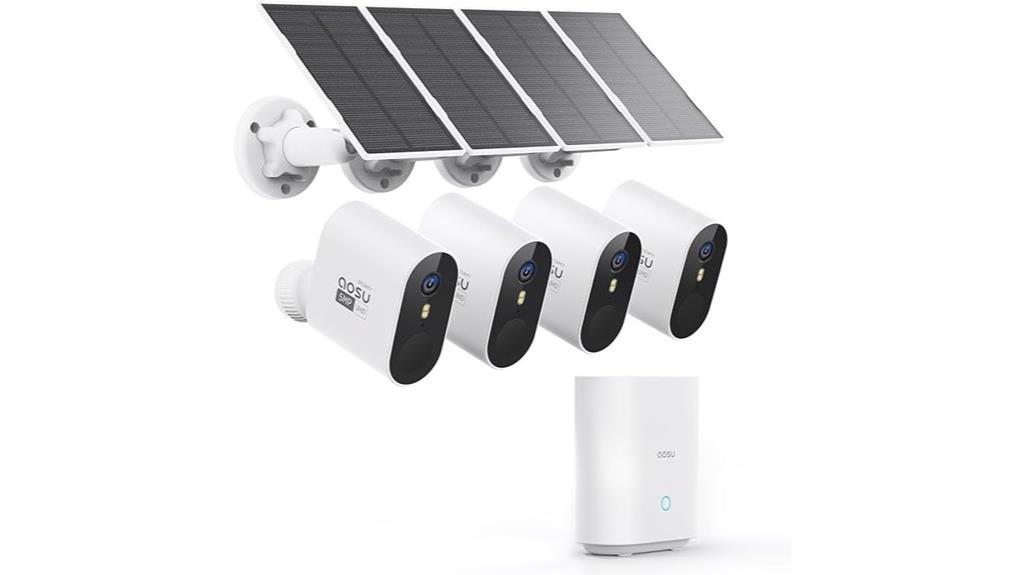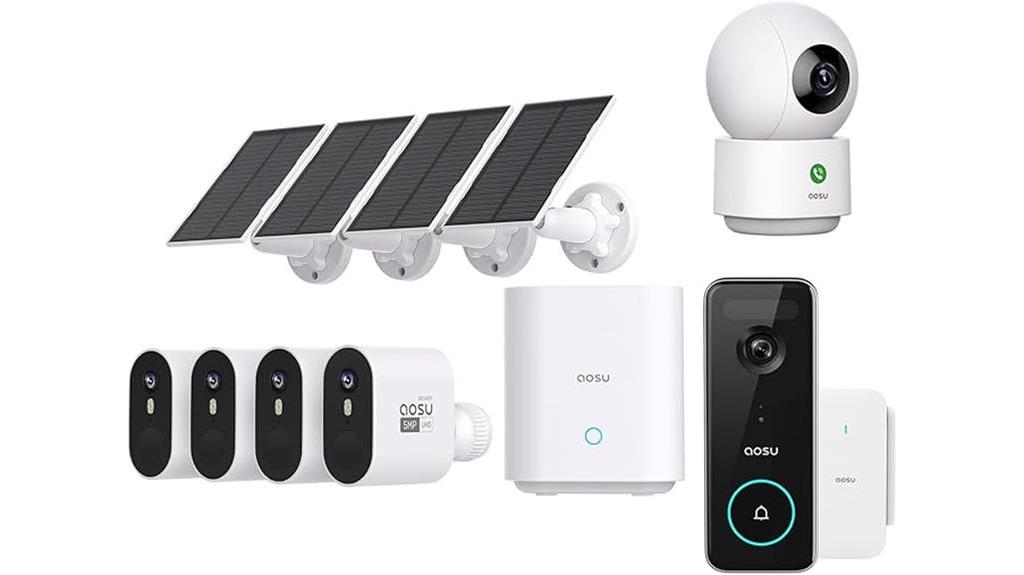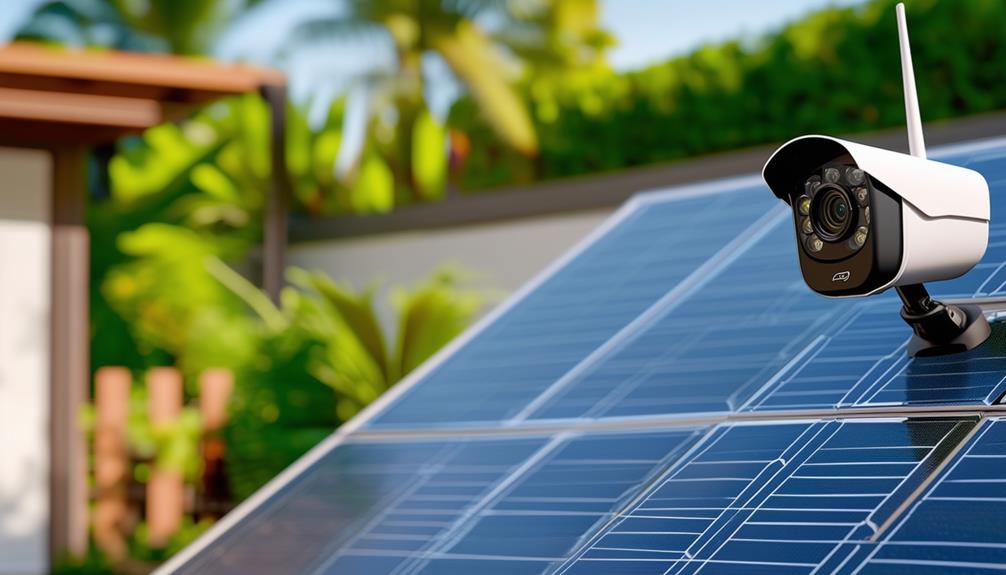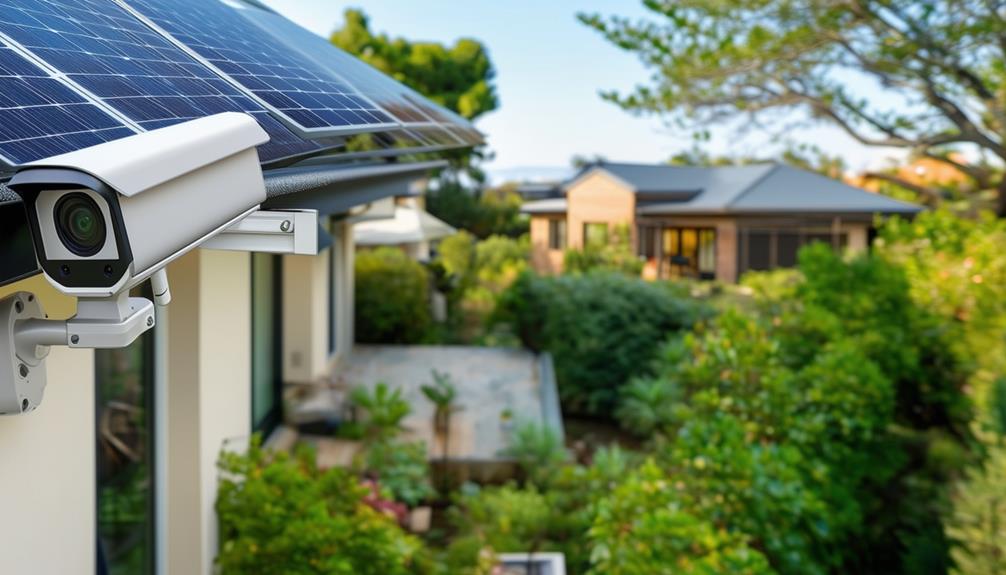For the best Solar Security Cameras for wireless outdoor surveillance, I recommend the AOSU Solar Security Cameras Wireless Outdoor. These cameras offer a wire-free setup powered by solar panels for long-lasting surveillance. With 5MP high-definition video recording and local storage without a subscription, these cameras guarantee cost-effective monitoring. Additionally, they provide a wide 166-degree field of view with advanced night color vision. For even more security, consider the AOSU SolarCam Max System Kit, boasting 5MP clarity and high-quality night vision. To ensure the best fit for your needs, let’s dive deeper into these options and the key considerations for choosing the perfect solar security camera for your home.
Key Takeaways
- Select cameras, like AOSU SolarCam Pro, offer 2K QHD resolution, a 166-degree wide-angle view, and advanced features like cross-camera tracking.
- Look for cameras with flexibly installed solar panels and long-lasting backup batteries for reliable power management.
- Ensure high levels of weather resistance with features such as IP66 ratings, anti-fog technology, and efficient power consumption.
- The Arlo Pro 4 is a top choice because it offers 2K resolution, a 160-degree field of view, and additional security features.
- Devices like the Rraycom 5MP Security Camera are wire-free and solar-powered for reliable, low-maintenance outdoor monitoring.
AOSU Solar Security Cameras Wireless Outdoor

For homeowners looking for reliable and cost-effective security solutions, the AOSU Solar Security Cameras Wireless Outdoor is an excellent option. It offers a seamless wire-free setup and long-lasting power through its solar panels.
These cameras offer 5MP high-definition clarity and advanced features such as intelligent cross-camera tracking and local storage without a subscription. Thus, you can enjoy high-quality video recording and monitoring without incurring extra costs.
The wide 166-degree field of view guarantees no blind spots, and with advanced night color vision, you can still see clearly in low-light conditions. Additionally, the cameras are water-resistant and can operate wirelessly, making them perfect for outdoor deployment.
Best For Homeowners seeking cost-effective security solutions with advanced features and seamless setup.
Pros:
- It offers a wire-free setup and long-lasting power through solar panels, making it cost-effective and convenient.
- Provides 5MP high-definition video recording and advanced features like intelligent cross-camera tracking.
- Includes local storage without a subscription, ensuring no additional costs for high-quality monitoring and recording.
Cons:
- It may require periodic cleaning of solar panels for optimal performance.
- Battery life may vary depending on weather conditions.
- Limited flexibility for placement due to solar panel requirements.
AOSU SolarCam Max System Kit

The AOSU SolarCam Max System Kit stands out as an ideal option for anyone seeking advanced home security. It offers 5MP high-definition clarity, intelligent cross-camera tracking, and extensive storage capabilities. With each camera capable of capturing high-resolution images and real-time motion tracking, the kit provides thorough coverage of your property.
Additionally, the system’s easy setup and integration make it user-friendly. The high-quality night vision ensures monitoring is effective even after dark.
When it comes to system compatibility, it’s essential to note that each AOSU SolarCam Max System Kit operates independently and can’t be combined with other Homebase kits. Product warranty details are available for each item, and customers can provide feedback on pricing and quality, ensuring that users have the necessary support and resources.
Best For Homeowners looking for advanced, high-resolution surveillance solutions for extensive property monitoring.
Pros:
- 5MP High-Definition Clarity: Provides detailed visuals both day and night with improved night vision capabilities.
- Intelligent Cross-Camera Tracking: Automatically links multiple cameras for comprehensive surveillance.
- Ample Storage: Built-in 32GB memory supports up to 120 days of recording and eliminates subscription fees.
Cons:
- Independent Operation: Each AOSU SolarCam Max System Kit cannot be combined with other Homebase kits.
- Complex System: This may require technical expertise for optimal setup and operation.
- Higher Cost: Compared to simpler security solutions, the price point might be higher due to advanced features.
Factors to Consider When Choosing Solar Security Cameras Wireless Outdoor

When selecting a wireless solar security camera for my home, I need to weigh several important factors.
First and foremost, I have to consider the device’s power sources, ensuring the battery and solar panel can handle the camera’s functionality.
Additionally, the field of view, waterproofing, video quality, and compatibility with my existing systems are all key considerations that will determine the effectiveness of my home security setup.
Device Power Sources
Solar security cameras offer a sustainable and convenient option for home surveillance. They don’t require direct electrical outlets or batteries, instead harnessing sunlight for power through integrated solar panels. The advantage of using solar panels is significant, as they reduce our reliance on traditional power sources and help lower energy costs, making these cameras an environmentally friendly choice.
However, it’s crucial to consider the device’s power storage capacity when selecting a solar security camera, as this determines its continuous operation during periods of low sunlight or inclement weather.
Given these considerations, some solar security cameras come with backup battery options. These enhancements ensure uninterrupted surveillance even in less favorable solar conditions. It’s important to evaluate the specific requirements of your home and the available sunlight when choosing a solar security camera. For instance, a location with minimal direct sunlight might require a camera with a larger power storage capacity.
To guarantee optimal performance and reliable surveillance, take into consideration the following: the solar panel’s wattage, battery life, and smart features such as battery notifications.
Field of View
As you shop for solar security cameras wireless outdoor, the field of view is an important factor to consider since it directly affects the camera’s surveillance capabilities.
The wider the angle, the more extensive the coverage. A 360-degree view, for instance, is ideal for general property surveillance, while a narrower view, like 43.6 degrees, may be better suited for targeted areas such as entry points or specific corners.
The wider field of view not only reduces blind spots but also enhances motion detection and tracking. A panoramic camera covers a much broader area than standard cameras, ensuring that you don’t miss any important activities or potential security issues.
As you evaluate solar security cameras, consider one with a wider angle to maximize the effectiveness of your home security system. This will give you greater peace of mind, knowing that your property is more thoroughly monitored.
Waterproof Ratings
I need a security camera that can stand up against the elements. When it comes to outdoor use, waterproofing is vital. I look for cameras with high waterproof ratings, such as IP66, to make sure they can handle rain, snow, and other forms of moisture. Anything less could give me headaches in the long run.
A higher waterproof rating means better protection against water ingress and damage. It’s important to match the camera’s waterproof rating to my outdoor environment. For instance, if I live in an area prone to heavy rainfall, an IP66 or higher rating is a must. This ensures that my camera can withstand powerful water jets and continue to function properly.
Besides the rating, I also take into account the build and construction of the camera. A sturdy, weatherproof design is crucial for prolonged outdoor exposure. By investing in a waterproof outdoor security camera, I can have peace of mind and reliable surveillance year-round. It’s an essential factor to keep in mind when choosing the right solar security camera for my home.
Video Quality
When it comes to choosing a solar security camera for outdoor use, I prioritize image quality to guarantee crystal-clear footage that serves as effective evidence. High-definition video quality is essential, so I look for cameras with resolutions like 5MP for highly detailed and clear footage. This is important for reliably identifying subjects, even if they’re far from the camera.
Additionally, features like night color technology make sure video quality is maintained even in low-light conditions, which are common during nighttime surveillance. A high zoom ratio, such as 6x, also allows me to zoom in on specific areas or objects within the camera’s range, providing even more detailed footage.
Beyond the core video quality, I also consider the field of view. Expansive angles like 166 degrees provide broader coverage for monitoring, making it easier to keep an eye on the entire area.
Compatibility Options
When selecting the best solar security cameras for my home, I meticulously review their compatibility to ensure they integrate seamlessly with my existing devices. This includes checking if they’re compatible with my current smartphone or tablet and any smart home systems I use. This adaptability guarantees I can easily control and monitor my security system through various methods.
Another vital aspect is compatibility with popular voice assistants like Alexa or Google Assistant. This feature allows me to manage my security cameras with voice commands, making it more convenient and efficient.
I also verify that the cameras can connect to my home network via Wi-Fi or Ethernet, ensuring smooth communication and reliable monitoring.
Additionally, I consider the compatibility of potential add-on cameras or accessories that I might need in the future.
To conclude, I check that the cameras are compatible with my operating system, whether it’s iOS or Android, to simplify setup and monitoring. By carefully evaluating these compatibility factors, I can confidently choose the best solar security cameras for my home’s unique needs.
Battery Longevity
Securing your solar security cameras with a long-lasting battery is crucial for ongoing home monitoring; search for cameras with high-capacity batteries. These cameras can operate for extended periods without frequent recharging, providing you with peace of mind and dependable security.
One key aspect to ponder is efficiency in power management systems. Cameras that handle power well can maximize battery life, reducing downtime and guaranteeing you always have an active security system.
Another essential feature to look for is low power consumption. Cameras equipped with functions like PIR motion sensors can save battery power when not in use, extending battery life. In case of low battery levels, cameras with quick recharge capabilities ensure minimal downtime.
Some solar security cameras also offer intelligent power-saving modes that adapt settings based on environmental conditions to prolong battery life. When choosing solar security cameras, prioritize these elements to maintain continuous monitoring without the inconvenience of frequent battery replacements.
Weather Conditions
As I prepare to set up my solar wireless outdoor security cameras, I consider the variety of harsh weather conditions they’ll encounter, from heavy rains to blizzards and scorching heat waves, and how these specific conditions can directly impact their performance and longevity. I understand that extreme weather can be harmful to any outdoor equipment, and solar security cameras are no exception. Factors like intense rain, snow, and strong winds can diminish their effectiveness and lifespan if not designed to withstand such conditions.
That’s why I make sure to look for solar security cameras with a high IP weather resistance rating, such as IP66 or above. This guarantees that they can operate effectively even in the toughest weather conditions.
Another important consideration is the temperature range that the camera can function within, as extreme heat or cold can greatly affect battery life and overall functionality. Some cameras also come equipped with advanced features like anti-fog or anti-glare technology to maintain clear visibility in challenging weather conditions.
Regular maintenance is essential to ensure that my solar security cameras continue to perform at their best. This includes cleaning the lenses and solar panels to guarantee maximum energy harvesting and clear video quality.
Installation Flexibility
To guarantee smooth integration into my home security setup, I examine the installation options available for solar security cameras, focusing on versatile mounting methods and intuitive configuration processes that eliminate the need for complex wiring. For instance, I look for cameras that offer wall mounts, freestanding poles, or even tree-mounting options to ensure easy installation in various outdoor locations. Adjustable angles and flexible positioning are also vital for the best coverage of my property, as they enable me to direct the camera precisely where I need it.
Another essential factor is the availability of easy-to-follow installation guides or online tutorials that simplify the DIY setup process. This way, I can ensure that I install the camera correctly the first time, avoiding any potential security gaps. Additionally, I evaluate the wireless range and connectivity options to ensure smooth integration without the need for complex wiring.
Frequently Asked Questions
Can Solar Security Cameras Still Function During Prolonged Periods of Rain or Snow?
Yes, solar security cameras can still function during prolonged rain or snow. They are built to withstand weather conditions, often with high-capacity batteries and waterproofing to guarantee continued performance even in poor sunlight conditions.
Are Solar Security Cameras Typically More Expensive Than Traditional Security Cameras?
Are solar security cameras typically more expensive than traditional security cameras? Yes, they are. The additional cost stems from the integrated solar panel and battery, which provide wireless and off-grid capabilities.
Can Solar Security Cameras Be Installed in Shaded Areas Without Direct Sunlight?
“I can confirm that solar security cameras typically require direct sunlight for efficient charging. Installing them in shaded areas isn’t ideal, but some models include backup power options like batteries for cloudy days.”
Do Solar Security Cameras Have Built-In Memory for Video Storage?
“Yes, solar security cameras often have built-in memory for video storage. Some models like aosu’s solar cameras and the Vosker V150, for instance, come equipped with microSD card slots for local storage.”
Are Solar Security Cameras More Prone to Battery Drain During Winter Months?
‘I’ve noticed solar security cameras tend to drain batteries faster in winter due to shorter daylight hours. This affects the vast majority of solar-powered security cameras, meaning efficient power management is crucial during winter.’









